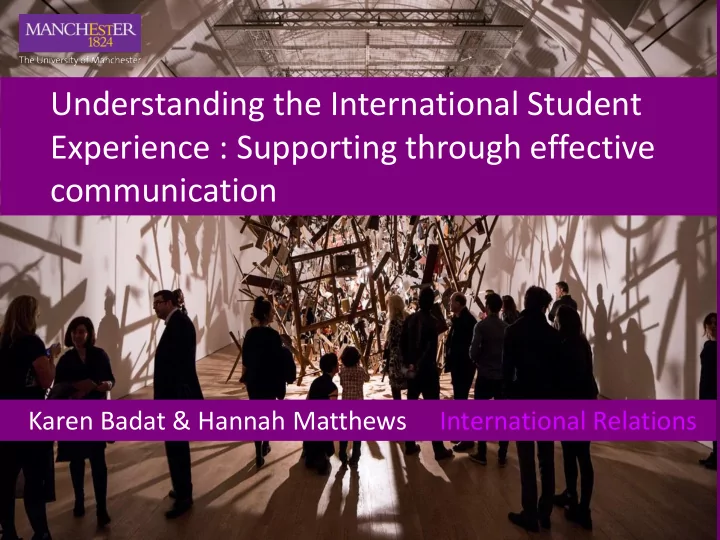

Understanding the International Student Experience : Supporting through effective communication Karen Badat & Hannah Matthews International Relations
• What are the issues? • Scenarios • A little bit of theory • How you can find out more
What are the issues?
You are invited to a Party Dress code is come as you are Time is NOW
Scenarios
A little bit of theory
Culture, personality or human nature? Hofstede, 2011 Specific to the individual Personality Inherited and learned Specific to the group or Culture Learned category Human Nature Universal Inherited Culture, as defined by the UNESCO is, “the set of distinctive spiritual, material, intellectual and emotional features of society or a social group, and that it encompasses, in addition to art and literature, lifestyles, ways of living together, value systems, traditions and beliefs”
One theory to assist our understanding ① High and low context cultures
High context refers to societies or groups where people have close connections over a long period of time. Many aspects of behaviour are not made explicit because most members know what to do and what to think from years of interaction with each other. Low context refers to societies where people tend to have many connections but of shorter duration or for specific reasons. In these societies, cultural behaviour and beliefs need to be spelled out explicitly so that those coming into the environment know how to behave.
High- and low-context cultures High-context culture and the contrasting low-context culture are terms first presented by the anthropologist Edward T. Hall in his 1976 book Beyond Culture. They refer to a culture's tendency to use high-context messages over low-context messages in routine communication. Higher-context cultures • African • Arabic • Brazilian • Chinese
High context cultures put great price on honour, reputation and tradition and will try to avoid surprises and minimize confrontation. Politeness is often valued more than clarity; Low-context, individualistic cultures tend to focus more on figures and closing the deal, and can be perceived as aggressive.
High to low An individual moving to a higher or lower-context culture may need to adapt and/or be accommodated in ways different from moving within cultures of similar context • A high context culture expects fewer relationships, but that these will be more meaningful • A high context individual is more likely to ask for assistance rather than attempt to work out a solution independently, and assistance is likely to be asked from the same few people. • The high context person may be frustrated by people appearing to not want to develop a relationship or continue to help them on an ongoing basis.
Context is everything
Tests 1 & 2
Cultural Literacy The idea that comprehension requires not just formal decoding skills but also wide-ranging cultural background knowledge. Eric Donald Hirsch, Jr
Effective Communication • More than language • Impact of culture • Impact of context
How can you find out more?
• HIGHER EDUCATION ACADEMY https://www.heacademy.ac.uk/search/site/international • CENTRE FOR THE STUDY OF THE FIRST YEAR EXPERIENCE http://www.sc.edu/fye/ • EUROPEAN FIRST YEAR EXPERIENCE CONFERENCE http://www.uib.no/en/efye_2015 • UNIVERSITY OF WARWICK, CENTRE FOR APPLIED LINGUISTICS http://www2.warwick.ac.uk/fac/soc/al/research/papers/ - especially good China resources • Student Support Listserv and events are organised by the Atrium • BRITISH COUNCIL http://www.britishcouncil.org/search?search_api_views_fulltext=international+stu dents • UKCISA http://www.ukcisa.org.uk/
Karen Badat karen.badat@manchester.ac.uk Hannah Matthews hannah. matthews@manchester.ac.uk
Recommend
More recommend